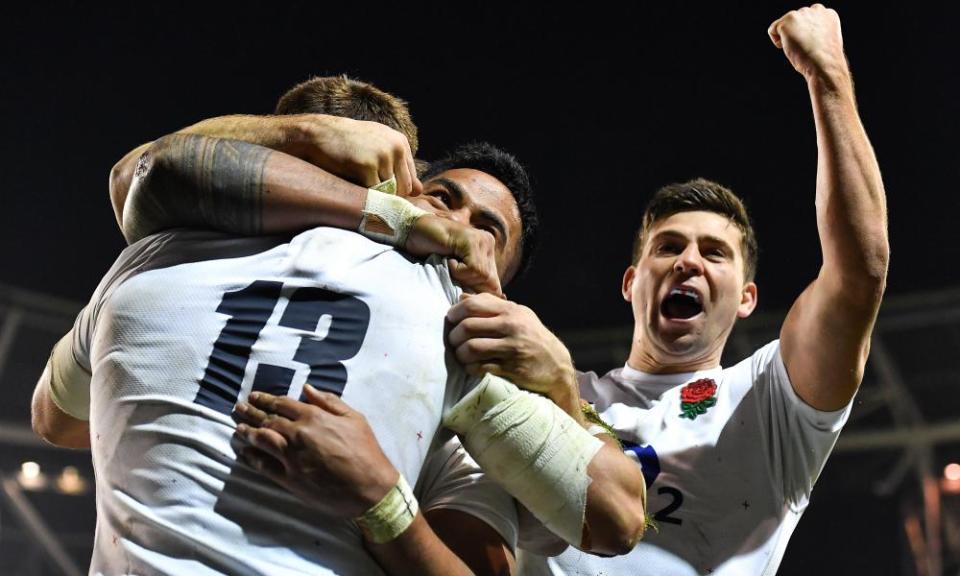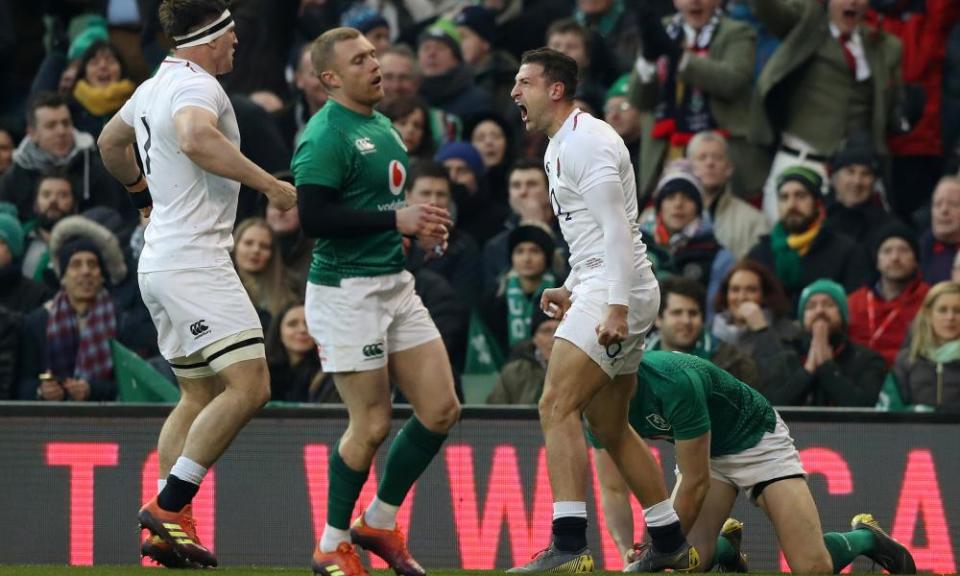Henry Slade scores twice as England stun Ireland in Six Nations

England may have won a grand slam and a Six Nations title under Eddie Jones as well as a series in Australia, but this was their first performance under him when they looked like a team capable of toppling New Zealand at the top of the world rankings. Ireland, the champions who in the past 18 months had defeated every other tier-one nation and were on a 12-match winning run at home, were skittles unable to get out of the way of the heavy artillery bowled at them.
There was a point in the third quarter when the game looked to be tilting towards Ireland. England were ahead 17-10, the score they had taken into the interval. They had spent most of the match on the front foot, apart from a period in the first half when they were reduced to 14 men when Tom Curry was sent to the sin-bin for a late challenge on Keith Earls. There was an assertiveness and an assurance to their play, starting in the opening seconds when they caught Ireland out with a quickly taken lineout that resulted in a try for Jonny May, in a reversal from the game here two years ago.
England were then seeking the grand slam to go with the title, but became stuck in a morass of slow possession. This time it was Ireland who were forced to kick hurriedly away rather than play from well behind the gainline and England who were dominant in the air and on the floor: the home side did not force one turnover at a ruck and saw little return from their box-kicks. England, in contrast, had time, moving the ball quickly after a tackle and prepared to kick into space and exploit Robbie Henshaw’s inexperience at full-back on an evening when the sky was clear and the wind barely flickered. The storm came from England.
Ireland were hustled into mistakes. While May’s try was reward for the pace England started with, so spooking Earls that he shot out of the line to try to intercept Owen Farrell’s long pass to Elliot Daly and left the England full-back with an overlap to exploit, their second was down to Ireland cracking under pressure. When Jacob Stockdale fielded Daly’s chip close to Ireland’s line, he was rushed into acting by the onrushing Jack Nowell, spilled the ball and left Daly with the task of getting his hand on it.
England, who conceded a try to Cian Healy after a driving lineout moments after Curry had returned to the field, could have had more. Nowell was tackled into touch and the visitors ended the opening half camped on Ireland’s line without finding a way over it, settling for a Farrell penalty. There was no response from Ireland after the break and 51 minutes in, England were deep in their opponents’ territory when Garry Ringrose sized up Farrell and thundered into the fly-half, whose pass fell loose. Johnny Sexton kicked the ball on and when Henry Slade knocked on in his 22, the match looked in the balance.

England had replaced one second-row, George Kruis, with Courtney Lawes, so when Maro Itoje left after 54 minutes with a knee ligament injury, he had to be replaced by a No 8, Nathan Hughes. Kyle Sinckler’s high tackle on Ringrose presented Sexton with his second penalty – the prop had supplied the first in the opening half when he was slow to roll away from a ruck. England’s lead was reduced to four points, the balance of their side had changed and the crowd, hushed for long periods, sensed it may after all be their night.
It is in such moments that reputations are made. At the point when the world’s form team reached out to grasp victory, it was wrenched away from them by a team that seemed to be guided by fate. Jones had talked in the buildup about using Nowell as a ninth forward but England’s head coach already has one. Mako Vunipola does the work of two, a prop who is an extra flanker. He made 25 tackles, embodying his side’s defiance.
Jones had started with five Saracens in his pack and England bore the hallmark of their club champions: focused and uncomplicated. With another Saracen, Farrell, in control behind, England used their physical presence as a means to an end rather than an end itself. For once, to see England play was to see them train and Ireland, whose half-backs Conor Murray and Sexton lacked match sharpness on an evening when they were unable to influence the pace of the game, struggled to adapt.
Ireland are a team that trade in certainties. The last time they won after trailing at half-time was in Argentina in the summer of 2014. A well-drilled, programmed side are at their most vulnerable playing catch-up, when scripts have to be hastily rewritten. The game may have looked there for them after Sexton’s second penalty but it faded like a mirage. After Farrell had missed a long-range penalty, England attacked from deep, May kicking to the line for Slade to outpace the defence. The try was reviewed – not, as Ireland wanted, for a suspected forward pass in the buildup, which Jérôme Garcès ruined as too historic to bother him, but for offside. Slade was level and the try stood.
Farrell’s third penalty 10 minutes from time ensured victory and Slade garnished it with a bonus point when he intercepted Sexton’s forced pass as an Ireland team so used to constricting opponents into mistakes was itself suffocated. John Cooney’s late try was little consolation for the champions, who are in Scotland on Saturday, the day before England face France. But after an opening round when a few images were shattered, nothing will be assumed.

